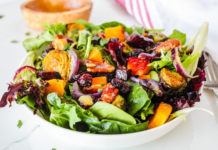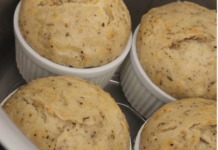When it comes to enjoying the delicious summer bounty of fruits and vegetables, many of us are not only concerned with removing bits of soil and garden bugs but also residual pesticides.
In recent times, there has been a popular trend on TikTok promoting the use of baking soda, white vinegar, and speciality “produce washes” to clean fruits and vegetables. However, is this the best method?
Are there risks associated with consuming pesticides on produce? Do you need to use special formulas to get your fruits and veggies clean? To find answers to these questions, we turned to experts with extensive knowledge about summer produce and pesticides.
[ How Risky Is It To Drink Eggnog? Food Safety Experts Speaks ]
According to Dr Kelly Johnson-Arbor, a medical toxicology physician and the medical director at the National Capital Poison Center in Washington, D.C., different types of pesticides can have varying effects on human health.
Some pesticides can cause neurological damage, while others are associated with chronic health conditions such as cancer.
There are also concerns about the effects of pesticides on reproduction and development, known as endocrine disruption. These concerns have led many people to seek ways to minimize their exposure to pesticides.
The Environmental Protection Agency (EPA) states that people are likely to be exposed to only very small amounts of pesticides, which are too insignificant to pose a risk.
However, the exact dose and timing of exposure required to cause harmful health effects are still unknown. Therefore, if you prefer to avoid pesticides on your produce, you are not alone.
The good news is that according to Dr Johnson-Arbor, plain running tap water is the simplest and safest method for cleaning produce.
Both the Centers for Disease Control and Prevention (CDC) and the Food and Drug Administration (FDA) recommend washing produce with running water and advise against using other solutions such as vinegar or commercial produce washes.
Fruits and vegetables have porous surfaces, so it is generally not recommended to use soap, detergent, or cleaning solutions on them.

The FDA explains that the safety and effectiveness of washing fresh produce with soap, detergent, or commercial produce washes have not been adequately tested. Moreover, these substances can be absorbed by the produce even with thorough rinsing, which can lead to illness.
While soaking produce in clean water may seem like an effective way to deep clean it, Dr. Johnson-Arbor warns against this method.
Soaking can spread germs through the water, resulting in a higher level of contamination. Additionally, it is important to be cautious about letting washed produce touch your sink, as sinks can harbour more bacteria than we realize.
Summer produce varies in terms of its sturdiness and texture. Some items, like watermelons, have hard shells, while others, like berries, are delicate. Chris Young, a California-based gardener and horticulture author, offers some advice for washing different types of produce:
– For sturdy fruits and vegetables, gently rinse them under cool running water.
– Be careful not to wash berries too vigorously, as they can become mushy.
– For leafy greens, separate the leaves and rinse them individually, cleaning all sides thoroughly.
– For produce with rough surfaces or crevices, like melons or cauliflower, use a produce brush to scrub away any dirt or debris.
– Pat the washed produce dry or use a clean paper towel before consuming.
By following these guidelines, you can effectively remove dirt and pesticide residue from your fruits and vegetables, ensuring a safer and healthier eating experience.
Catch up with the latest news from The Times Post on WhatsApp by following our channel. Click here to join.
Kindly follow @thetimespost on Instagram. On X (Twitter), follow @thetimespost2.















